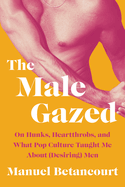
Culture writer and film critic Manuel Betancourt (Judy Garland's Judy at Carnegie Hall) makes gender theory both accessible and fun as he unpacks something like the male equivalent of a hope chest, brimming with all the idealized forms of masculinity thrust upon him and practically everyone else assigned male at birth. That he turned out gay only added to his complex feelings about what it means to be a man. In The Male Gazed, he turns his keen eye on masculine signifiers, like bulging muscles, an ineffable swagger, and a simple pair of classic white briefs.
The male object presents a distinct challenge for study, however, and Betancourt calls this out: "Granting itself claims to authority as well as universality, masculinity has rarely offered itself up for examination; it has always been subject, never object." But anyone familiar with masculinity's fragility is likely to wonder why it always seems to be in crisis.
Showcasing versatile insightfulness, Betancourt draws on distinctly Latin frames of reference from his Colombian roots (the "berraco" gender theory of Javier Omar Ruíz Arroyave, the Spanish-language films of Pedro Almodóvar, and the opulent legacy of astrologer Walter Mercado) just as handily as he considers a scatterplot of international guideposts (muscle-bound characters in Japanese anime and the queer underpinnings of villainous Disney daddies like Gaston and Jafar). This breadth of inquiry makes The Male Gazed feel well considered and charmingly personal as Betancourt denudes manhood of its preciousness. What he uncovers may be just enough to begin salvaging a robust and dynamic sense of masculinity from the toxic strains that have become so prevalent in social discourse. --Dave Wheeler, associate editor, Shelf Awareness

